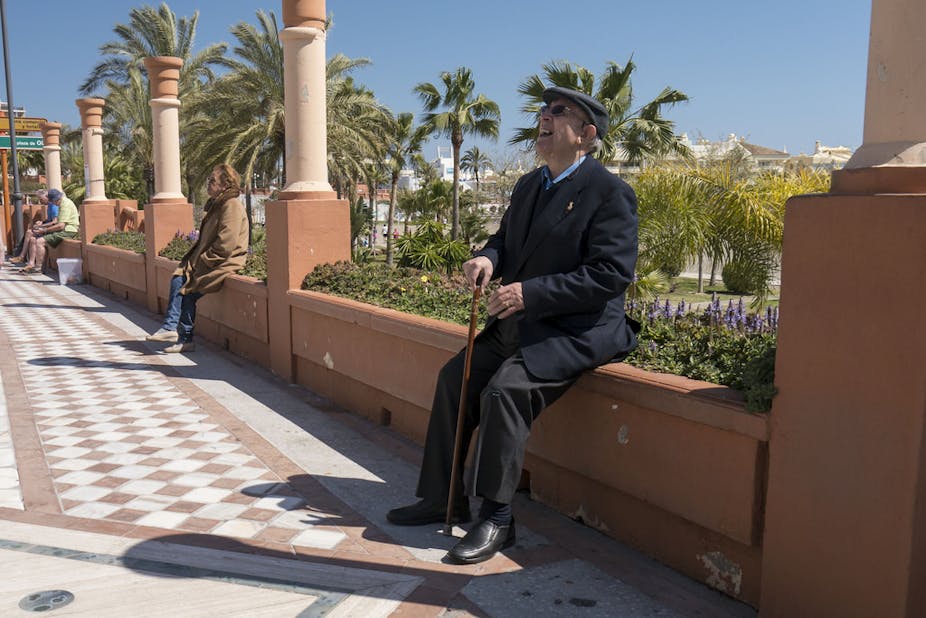Spain is home to more than 100,000 British pensioners. Most moved there many years ago to enjoy their retirement with the understanding that they would be able to export their pension and healthcare rights with them. But since the UK’s vote to leave the European Union, these rights are no longer guaranteed, and pensioners I’ve spoken to in Spain are uncertain about their futures.
It is often assumed that British people who retire to Spain are wealthy and spend their days sipping cocktails on the verandas of their luxury villas. While this is true for a small number, the vast majority are not wealthy. Instead they moved to Spain to make their limited retirement income go further because of the lower cost of living.
In my research on retirement migration over the last decade, I’ve spoken to numerous British people living in Spain who are entirely reliant on a British state pension as their only form of income. Many have now become elderly and are in need of additional care and support. They had been getting by with support from friends or voluntary organisations that operate in Spain. However, since the EU referendum, their lives have become fragile and uncertain.
Health and pensions
By and large the main concern for these pensioners is healthcare and whether they will still be able to access free healthcare once the UK leaves the EU. The government’s recent Brexit white paper recognises the importance of access to healthcare by British nationals living in the EU. Spanish president Mariano Rajoy has also indicated that he wants an early agreement to secure their rights. But so far, no such agreement has been reached.
Pensioners who are currently entitled to free healthcare via reciprocal arrangements between EU members are concerned that on Brexit day they will simply not be able to access the healthcare services upon which they depend – an issue highlighted in work by law scholars Tamara Hervey at the University of Sheffield and Joaquin Cayon-De Las Cuevas at the University of Cantabria.
Another concern is pensions and whether annual increases in the state pension will continue to be paid after Brexit. These increments are not paid to those living outside of the EU in countries like Canada and Australia, whose state pension is frozen at the amount it was when they left the UK. It’s possible the same rules could apply to those living in or moving to EU countries after Brexit.
In the meantime, the maximum British state pension of around £480 a month is barely enough to cover living costs and is low by European standards – in comparison the Spanish state pension averages around €900 (£790) a month. British pensioners in Spain told me they have already been affected by a drop in the value of the pound since the referendum. For some this has meant cutting out on the luxuries such as having a meal out. For others, this means not being able to turn on the heating (yes it does get cold in Spain in the winter), or cutting back on care.

Ralph’s story
On a trip to southern Spain in February 2017 I met a gentleman in his 90s who moved to Spain nearly 30 years ago. I’ll call him Ralph as he wanted to keep his identity anonymous. Ralph worked in the UK his whole career and when he developed severe arthritis in his 60s he was advised by his doctor to move to a sunny climate to enhance his quality of life. So, like many others, he chose Spain where his small state pension would go further. His health showed remarkable improvements and his regular hospital visits ceased.
Nearly 30 years later he has become frail and can no longer walk unaided. Following the death of his wife some years ago he now pays for a private carer to help him wash, dress and cook each day. He has found state-funded care is in short supply in Spain. A Spanish law introduced in 2007 means all residents are entitled to state-funded care, but a person needs to have very high care needs to qualify and waiting lists are long due to funding cuts over the last few years.
Since the drop in the value of the pound, Ralph’s rent, heating and carer costs exceed his state pension. He is very worried, not only about his spiralling living and care costs, but also his access to healthcare. He would not be able to pay even a small contribution towards healthcare and feels that if there is no deal for British pensioners in Spain after Brexit he would have no option but to return to the UK to ensure continued access to healthcare under the NHS. But he does not want to return as his home is in Spain – and knows that his health will decline in the cold weather.
Ralph is one of many people I spoke to who are in a similar situation: they don’t want to return to the UK but fear they may have to if access to healthcare in Spain is not guaranteed. But for some, the only solution will be to return to the relative safety of the UK NHS and broader welfare state. These people did choose to move overseas, but they chose to live in Spain with the understanding that they would be able to transfer their healthcare and pension rights with them. And those who had lived overseas for more than 15 years were not even entitled to vote and so were denied any say in their future.

